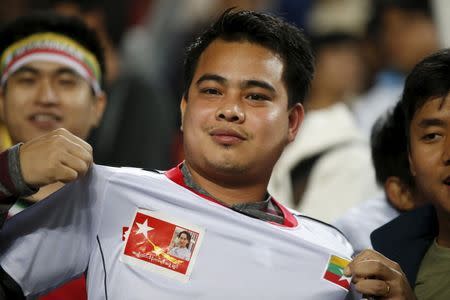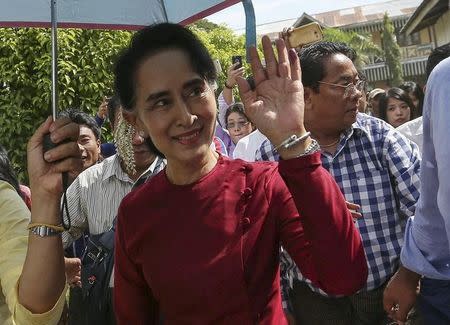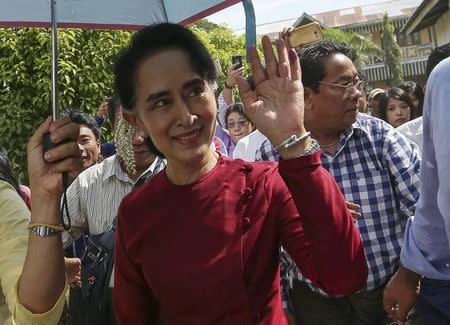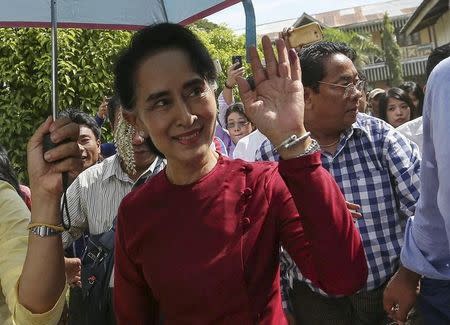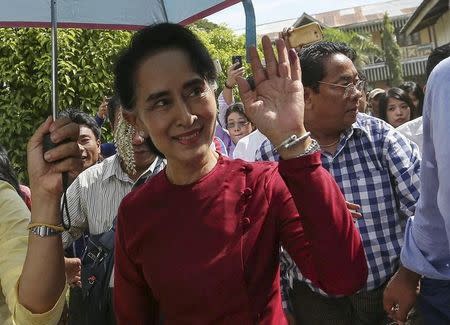World leaders laud Myanmar election as Suu Kyi secures majority
By Antoni Slodkowski
YANGON (Reuters) - Myanmar democracy champion Aung San Suu Kyi's opposition party on Friday clinched enough seats in parliament to elect a president and form a government when incoming lawmakers convene next year.
Results from the country's election commission confirmed the thumping victory that Suu Kyi's National League for Democracy (NLD) had claimed after the first free nationwide election in 25 years on Sunday.
The confirmation came five years to the day since the junta released Suu Kyi from house arrest. She had been confined for the best part of two decades.
The triumph of the charismatic Nobel peace prize laureate sweeps out the old guard of former generals that has run Myanmar, also known as Burma, since President Thein Sein ushered in a raft of democratic and economic reforms four years ago.
Despite the landslide, Suu Kyi cannot become president herself under a constitution drafted by the military before the end of nearly 50 years of rule. She has said she will run the country anyway, through a proxy chosen by her party.
Results have trickled in since the weekend, and on Friday the election commission announced the latest batch of seats that pushed the NLD over the threshold to secure an absolute majority in parliament.
PRAISE FROM OBAMA
United Nations Secretary-General Ban Ki-moon and U.S. President Barack Obama had already congratulated her on the victory.
In a call with Suu Kyi, Obama "commended her for her tireless efforts and sacrifice over so many years to promote a more inclusive, peaceful and democratic Burma", the White House said.
Obama and Ban also praised Thein Sein for successfully staging the historic poll, with the UN chief acknowledging his "courage and vision" to organise an election in which the ruling camp was trounced.
Obama has visited Myanmar twice over the past three years, hoping to make its transition to democracy a foreign policy legacy of his presidency. He will meet with Thein Sein, among other regional leaders, during a trip to Asia this month.
Thein Sein, whose semi-civilian government took power when the junta stepped aside in 2011, and powerful army chief Min Aung Hlaing, have said they would respect the result and hold reconciliation talks with Suu Kyi soon.
Such unambiguous endorsements of Suu Kyi's victory could smooth the lengthy post-election transition ahead of the last session of the old parliament, which reconvenes on Monday.
"We need to prepare to hand over duties systematically and cleanly to the government that will emerge in accord with the desire of the people," Information Minister Ye Htut said in a Facebook post on Friday, a day after a cabinet meeting.
The NLD will make national reconciliation its priority, as well as putting an end to decades of conflict between the army and rebel ethnic groups in the country, said Win Htein, a senior NLD leader.
MUCH HARD WORK
While the election and two months of campaigning in the run-up were largely peaceful, global leaders stressed that a large number of people, estimated by some rights activists at around 4 million, were unable to cast their ballots.
"He is regretfully aware that a large number of voters from minority communities, in particular the Rohingya, were denied the right to vote and some were disqualified as candidates," Ban Ki-moon's spokesman, Stephane Dujarric, said in a statement.
"There is much hard work that remains ahead on Myanmar's democratic journey and towards making future elections truly inclusive."
Myanmar's government has denied Rohingya Muslims citizenship, and hundreds died in clashes with ethnic Rakhine Buddhists in 2012. Some 140,000 Rohingya live in squalid camps, while thousands more have fled by boat, leading to a regional migration crisis.
Suu Kyi has been criticized for not speaking out against abuses faced by the Muslim minority. The Rohingya situation is one of the most contentious issues the new government will face.
With Suu Kyi's victory confirmed, the focus is shifting to the NLD's presidential candidate and its plans for government.
Myanmar's president runs the executive, with the exception of the powerful ministries of interior, defence and border security, which are controlled by the military.
Under the indirect electoral system, the upper house, lower house, and military bloc in parliament each put forward a presidential candidate. The combined houses then vote on the three candidates, who do not have to be elected members of parliament.
The winner becomes president and forms a government, while the losers become vice presidents with largely ceremonial responsibilities. The NLD has won enough seats to have an overall majority in the joint chambers and ensure its candidate becomes president.
The vote for the presidency will take place after the new members take their seats in both houses in February. The president will assume power by the end of March.
(Additional reporting by Aubrey Belford and Aung Hla Tun; Writing by Antoni Slodkowski and Simon Webb; Editing by Alex Richardson and Mike Collett-White)


